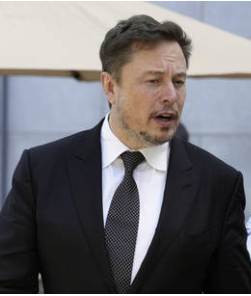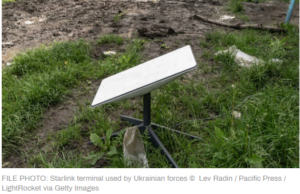
Elon Musk- Foto has taken from AFP
STRATEGIC ASSESSMENT. Tech billionaire Elon Musk has said that he will provide satellite internet access to “internationally recognized aid organizations” in Gaza via his Starlink network. Phone and internet lines went down in the enclave after a heavy Israeli bombardment on Friday.
Musk made his announcement on X (formerly Twitter) on Saturday, stating that SpaceX’s Starlink division would “support connectivity” with the besieged strip.
There are apparently a number of Starlink terminals in Gaza, but in a separate post on Saturday, Musk said that none of these devices had attempted to communicate with the satellite network. “It is not clear who has authority for ground links in Gaza, but do we know that no terminal has requested a connection in that area,” he wrote on X.
Internet and cell phone services stopped working in Gaza on Friday night after a wave of Israeli airstrikes. Gaza’s largest telecommunications operator, Paltel, announced that its infrastructure had been totally destroyed in the bombing, which preceded the deployment of Israeli ground troops to the enclave.
“The intense bombing in the last hour caused the destruction of all remaining international routes linking Gaza to the outside world,” the company said.
The outage left news organizations and aid groups unable to reach their workers, with the UN children’s agency and Doctors Without Borders both reporting no contact from their employees. RT Arabic was also temporarily unable to contact its correspondents and photographers in Gaza.
Musk’s announcement marks the second time that he has deployed Starlink to a combat zone. Shortly after the start of Russia’s military operation in Ukraine, the tech tycoon announced that he would deliver Starlink terminals to the Ukrainian side and pay for their upkeep. However, he fell out of favor with Kiev when he barred the Ukrainian military from using the network to guide drone strikes on Russian ships in the Black Sea.
“If I had agreed to their request, then SpaceX would be explicitly complicit in a major act of war and conflict escalation,” he explained last month. The Pentagon has since announced a deal to lease Starlink satellites for military use.
Meanwhile, Israeli Communications Minister Shlomo Kahri has vowed that “Israel will use all means at its disposal to fight” SpaceX CEO Elon Musk’s planned provision of Starlink internet access to Gaza.

“Hamas will use it for terrorist activities,” Kahri claimed in a post on X (formerly Twitter), adding that “there is no doubt about it, we know it, and Musk knows it.”
In response, the tech billionaire said he is “not so naive,” explaining how the proposed scheme would work, while promising to “do a security check with both the US and Israeli governments before turning on even a single terminal.”
“Per my post, no Starlink terminal has attempted to connect from Gaza. If one does, we will take extraordinary measures to confirm that it is used *only* for purely humanitarian reasons,” Musk said.
Musk said that he would open the Starlink satellite network to “internationally recognized aid organizations” working in Gaza, after a wave of Israeli airstrikes severed the enclave’s last phone and internet connections with the outside world.
Internet and cell phone services stopped working in Gaza on Friday night after a wave of Israeli airstrikes. The outage left news organizations and aid groups unable to reach their workers, with the UN children’s agency UNICEF, the World Health Organization, Doctors Without Borders, Red Cross and Red Crescent all reporting no contact from their employees. RT Arabic was also temporarily unable to contact its correspondents and photographers in Gaza.
Musk’s plan would mark the second time that he has deployed Starlink to a combat zone. Shortly after the start of Russia’s military operation in Ukraine, the tech tycoon supplied Kiev with Starlink terminals. However, he fell out of favor when he barred the Ukrainian military from using the network to guide drone strikes on Russian ships in the Black Sea.





